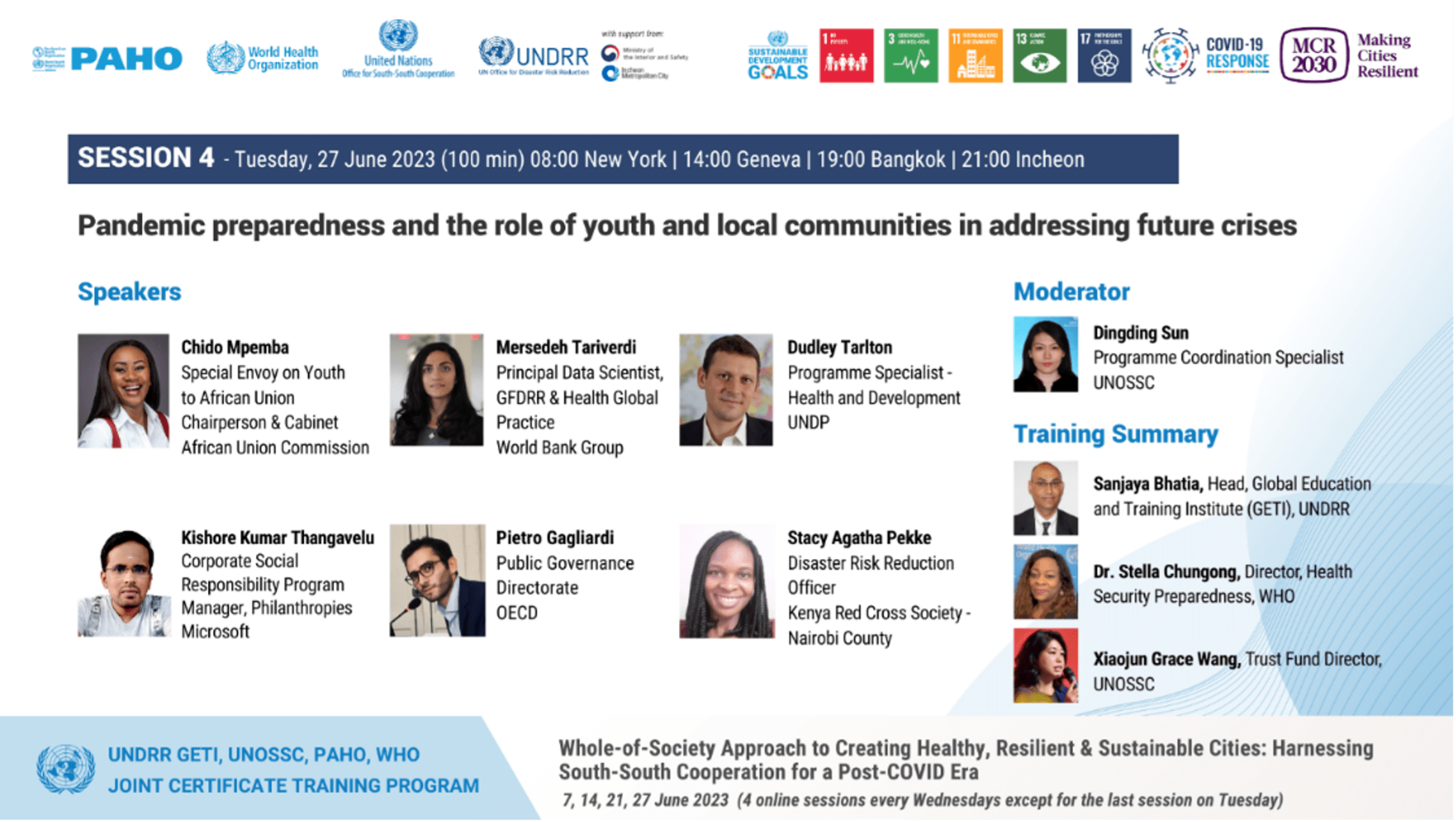Thematic Cities Cluster
Disaster Risk Reduction & Mitigation in Resilient Cities
Also available on BiliBili
For instance, 81% of the population in the Americas and the Caribbean lives in cities and, among the urban population, 25% lives in precarious and vulnerable settlements, subjects to social, political, and economic disparity and thus, vulnerable to disasters especially this pandemic (UNDRR, 2020b).
The COVID-19 pandemic hit many cities hard but also served as a wake-up call for urban leaders to reconsider the way cities are organized, planned, governed and the way investments in cities should be evaluated. As such, the knowledge sharing between cities by reporting practices that have been already tested and implemented by one city and that can be successfully adapted by another is highly desired.
In 2020, the Cities Project organized five capacity training webinars jointly with UNDRR, PAHO/WHO received participation from over 2400 participants from over 140 countries. In 2021, this training series held jointly with UNDRR and PAHO/WHO again attracted over 5,000 registrations from 165 countries and territories, and close to 3,000 participants from 155 countries and territories joined the sessions live.
As a follow-up to the results, Cities Project will continue organizing trainings and promoting collaborations among cities and institutions under this theme in partnership with specialized UN agencies and partners and facilitating new pilot projects to accelerate the transfer of knowledge, technology, and innovation among the Global South.
The Cities Project welcomes city partners interested in participating in this Cities Cluster on Disaster and risk reduction, mitigation in resilient cities and hopes the knowledge exchanged here leads to more South-South cooperation and a swift post-pandemic social and economic recovery.
Featured Members of this Cluster

National Council for Scientific Research (CNRS-L), Lebanon

Disaster Risk Management Unit, Lebanon

Baguio, the Philippines

Izmir, Turkey

Buenos Aires, Argentina

Cities Alliance, UNOPS

International Network on Small Hydro Power (INSHP)

Santiago, Chile

Mersin, Turkey

Mombassa, Kenya

Rio de Janeiro, Brazil

Shah Alam, Malaysia

Mumbwa, Zambia

Gansu Provincial People’s Association for Friendship with Foreign Countries (GPAFFC), China

Disaster Risk Management Council, Universidad de Sta. Isabel, Philippines

São Paulo, Brazil

Institute for Sociological, Political and Juridical Research of Ss. Cyril and Methodius University, North Macedonia

United for Smart Sustainable Cities (U4SSC), ITU

Afadzato South District, Ghana
Featured Disaster Risk Reduction & Mitigation Solutions on South-South Galaxy
Strengthening Capacity in DRM in Europe, Latin America and the Caribbean
ESCAP Multi-Donor Trust Fund for Tsunami, Disaster & Climate Preparedness
DRR and Sustainable Local Development Training Courses
Water Farming for Climate Resilient Agriculture and Disaster Preparedness
Strengthening DRR in Malawi
Caribbean Risk Management Initiative
Drones for Resilience
Post-Disaster Emergency Response in South Asia
Latest News and Updates

Training Series (2020-2025): Leveraging South-South and Triangular Cooperation – Inclusive and Technological Innovations for Urban Health & Disaster Risk Reduction
Since 2020, the United Nations Office for South-South Cooperation (UNOSSC), the United Nations Office for Disaster and Risk Reduction (UNDRR) Global Education and Training Institute (GETI), and the Pan American Health Organization (PAHO/WHO) have jointly organized...

UNOSSC Director visited NDRCC to Strengthen Collaboration on Disaster Risk Reduction through South-South and Triangular Cooperation
[vc_column column_padding="no-extra-padding"...

Local Representatives and Technical Experts from Lebanon and China Participate in Training on Disaster Risk Reduction
[vc_column column_padding="no-extra-padding"...

Whole-of-Society Approach to Creating Healthy, Resilient and Sustainable Cities
UNOSSC, UNDRR GETI, PAHO/WHO & WHO conclude joint online training programme with South-South exchange highlighting the role of youth and local communities in future pandemic preparedness 2023 marks the midpoint in the implementation of the Sendai Framework for...
Knowledge Products

Training Booklet: Transitioning to Complex Risk Management and Resilient Urban Futures – Harnessing South-South Cooperation and Learning from COVID-19
[vc_column column_padding="no-extra-padding"...

Spotlighting: Cities and Other Sub-National COVID-19 Responses for SSTC (UNOSSC-UNDRR, 2022)
[vc_column column_padding="no-extra-padding"...

Beyond the pandemic: Building Back Better from Crises in Asia and the Pacific
[vc_column column_padding="no-extra-padding"...

Training Report: Making Cities Resilient
[vc_column column_padding="no-extra-padding"...
